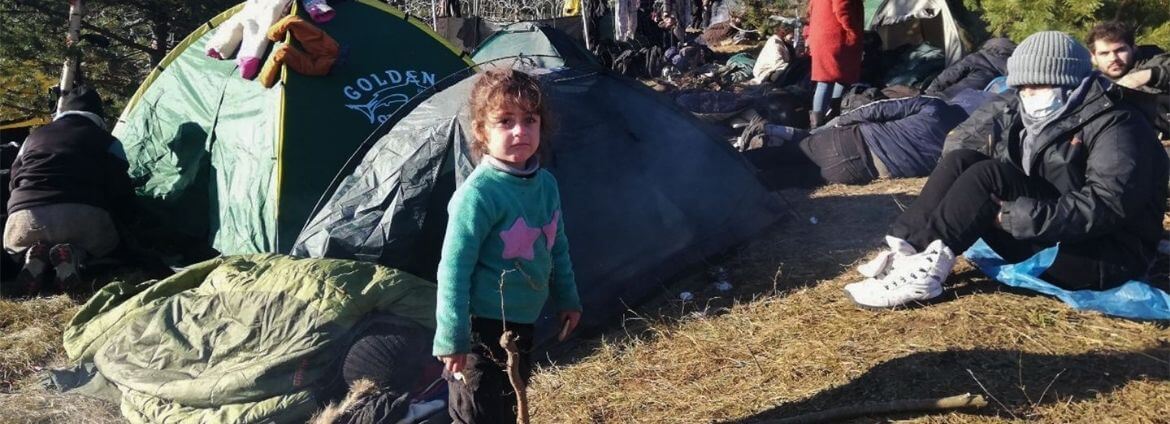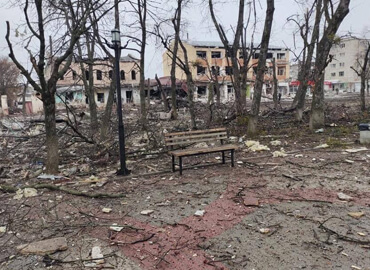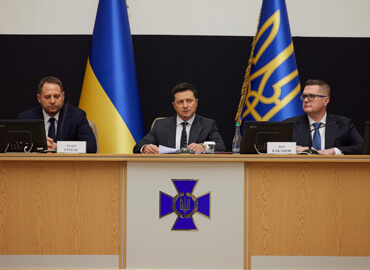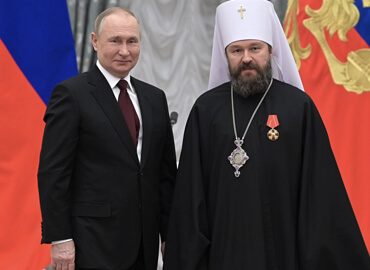Poland successfully fought off the first large-scale attack by migrants and an attempt to force an advance from Belarus at the Kuznitsa-Bruzgi border crossing. However, the level of tension did not decrease, and media manipulations became even more active. Is the migration crisis over? Who has benefited from the escalation on the borders of Belarus and who is interested in having the conflict continue?
Poland and Lithuania, with EU support, have shown a strong commitment to defending their borders. Tough opposition, pressure from the European Union, international organizations, and the threat of a fifth package of sanctions have forced the Lukashenko regime to stop the physical displacement of migrants, who are now located in the transport and logistics center next to the border crossing.
The migrant crisis has shifted from the phase of hot confrontation – when migrants threw stones at the Polish military who were then forced to respond with water cannons – into a struggle for position.
Polish Prime Minister Mateusz Morawiecki has stressed that the hybrid war between Alexander Lukashenko and Vladimir Putin against the EU continues. He called it the largest attempt to destabilize Europe in 30 years.
Angela Merkel, while still serving as chancellor, called Lukashenko twice on the phone, and twice he had conversations with Putin. The self-proclaimed president is trying to make the most of these interactions to demonstrate his own legitimacy. But did Lukashenko come out of this as a winner? Or maybe this is just an element in the Kremlin’s strategy to escalate relations with the West, directed against the unity of the European Union?
Who is behind Lukashenko’s actions?
In addition to the Polish prime minister, that the Kremlin is behind the coordination of the migrant crisis has also been raised by other European politicians. British Foreign Secretary Liz Truss believes that it is Putin who must put an end to the «shameful» migrant crisis. In a column for The Telegraph, she wrote that the Kremlin has «clear responsibility» for ending the «manufactured» use of desperate people as pawns.
The migration crisis has clearly shown that Moscow and Minsk are working in concert and are increasing tensions on their western borders. However, now Russia is attempting to distance itself as much as possible, taking the role of a kind of mediator. In crisis situations, the Kremlin seeks to act through a proxy while maintaining control over the situation.
The rhetoric of official Russian media is trying to shift responsibility to the so-called «collective West.» At the same time, both Moscow and Minsk are accusing Europe of inhumane treatment of migrants.
Lukashenko himself essentially admitted that the regime is facilitating channels of illegal migration. In an interview with the BBC, he did not deny that the Belarusian security forces «allow them to move to Polish territory.» The self-proclaimed president continues to blackmail the EU by not holding back migrants in response to the sanctions imposed.
Lukashenko’s words fully accord with the Kremlin’s narratives and statements by the Russian Foreign Ministry regarding NATO and Ukraine’s aggressive policies. For example, on November 25, Lukashenko accused the U.S. of «wanting to start a war with the hands of Poles, Balts, and Ukrainians, using the subject of migrants on the border of Belarus and the EU.»
The Kremlin is using the situation to increase its military presence in Belarus, specifically combat-ready aircraft capable of carrying nuclear weapons, placing Iskander units on the border with Ukraine, and declaring readiness to jointly defend Belarus against the «hostile West.»
The migration crisis can be viewed as a puzzle in Moscow’s strategy to increase tensions and escalate conflict with the EU and NATO. This is how the Kremlin achieves its intermediate goals, in part gaining additional leverage for launching Nord Stream 2 and cementing Belarus in the zone of Russian influence. In turn, Lukashenko needs Europe to recognize his legitimacy and end sanctions.
At the same time, Russia is striving to make the most of the manufactured tension points to split the EU. Even though European countries are now unanimous in assessing the causes and consequences of the migration crisis, the Kremlin, through media operations, is trying to strengthen existing friction within the European Union, especially along between Poland and the EU.
Disinformation and manipulation
The migration crisis has shown that disinformation remains one of the most powerful tools for hybrid attacks. Manipulative pictures of women children and women are instantly disseminated by pro-Kremlin media, which have been repeatedly found blatantly falsifying information.
Deputy Chairman of the Polish Foreign Ministry Marcin Przydacz has said that Belarus and Russia are conducting an information campaign against Poland. Their goal is to make Warsaw the culprit in the migrant crisis.
Belarusian and Russian state propaganda also tried to use Merkel’s call as an opportunity to depict Lukashenko as the winner. Specifically, they disseminated information that he proposed to the EU to create a humanitarian corridor to Germany for two thousand refugees in a spontaneous camp. And supposedly the Germans even agreed to house them in Munich. Berlin, however, immediately refuted this. German Interior Minister Horst Seehofer called such reports «disinformation.»
How Ukraine fits in
Lukashenko really wants to drag Ukraine into the migrant crisis. He has repeatedly stated that they are trying to transfer weapons from Donbass to the migrant camp to arrange an armed provocation and a clash between Polish and Belarusian border guards and the military.
In Ukraine itself, so far only sporadic attempts by migrants to enter have been recorded. These «tourists» are sent back to Belarus. At the same time, they are strengthening border protection. However, the migrants are not interested in Ukraine, as their main goal remains Germany and other countries of Western Europe.
The Kremlin is using the migrant crisis against Ukraine in the same way as a military threat, blurring the line between the threat and the actual use of force.
What is happening with the migrants now?
Two thousand migrants, under the control of the Belarusian security forces, have been living for a week in a logistics transport center, where conditions are far from ideal, but at least people are spending the night indoors. Without this, worsening weather conditions could lead to deaths and a humanitarian disaster, which would be difficult for the Lukashenko regime to justify.
The main reason why migrants remain at the border is that they are fueled by the hope of the opportunity to get to Germany, which is the main destination for many. They mainly regard Poland as a transit country.
However, under international pressure, the regime began to gradually return migrants to their home countries. Several planes have already left from Minsk to Iraq. However, this is a drop in the bucket from the number that continues to be found in Belarus.
Some simply have nowhere to go back to because they sold everything in the hope of getting into the EU. Therefore, most likely, most will continue to stay in Belarus and look for other means and opportunities to get to the European Union.
Migrants have now changed tactics and are attacking borders in smaller groups in different areas. Essentially, every day Polish border guards report that they have prevented attempts to cross the border in groups of 150-200 people.
Polish Prime Minister Mateusz Morawiecki fears that refugees from Afghanistan will soon start arriving in Belarus. Lukashenko even announced an increase in the number of Afghan refugees during his visit to the Bruzgi refugee camp. In addition, when speaking to migrants, he essentially voiced support for their attempts to illegally cross the border into the EU.
What can Europe do and how long will the crisis last?
The European Commission is planning on conducting technical negotiations, including with the Belarusian authorities, to return migrants home. It is equally important to cut off the channels through which migrants enter Belarus, because if this flow continues no other measures will be effective.
For example, Uzbekistan has already prevented taking citizens of six countries on flights to Minsk. Turkey and the UAE have also imposed restrictions on the transportation of potential migrants. Syrian airline Cham Wings Airlines canceled all flights to Minsk under threat of sanctions.
However, such measures cannot guarantee total success, as the Lukashenka regime is quite capable of establishing similar channels if necessary for transporting people from other countries of the Middle East or along other routes, including through Russia.
It is already known that the EU will soon approve the fifth package of sanctions and that the contents are being discussed. It is expected that this sanctions list will include 28 individuals and legal entities, for example, Grodno Azot and Belarusneft, as well as Belavia Airlines, despite Minsk’s efforts to prevent this.
Poland, in turn, is threatening to completely close the border with Belarus to deprive it of the option of transiting goods, including by rail. Although this decision has not received unanimous support at the EU level, since we are talking about a common European market Warsaw insists that it has the right to unilaterally resolve such issues.
Lithuania and several other European countries are considering the possibility of prosecuting the Lukashenko regime for the mistreatment of migrants.
The EU is planning on allocating funds to strengthen the border with Belarus and triple material assistance to Poland, Lithuania, and Latvia.
Despite measures taken, it can be expected that Lukashenko will continue to attack and blackmail the European Union with migrants. In heating up the situation on the border before the so-called «referendum» is held in February 2022, the regime will try to achieve two goals – to retain power and force the EU to negotiate with Lukashenko, thereby making up for the lack of legitimacy.
The constant tension at the border also makes it possible to form the required image for the media, beneficial for both Minsk and Moscow, which views migrants as an effective means of pressure on the EU and NATO.
Материал доступен на русском языке: Мигранты на границе: как долго будет продолжаться шантаж











